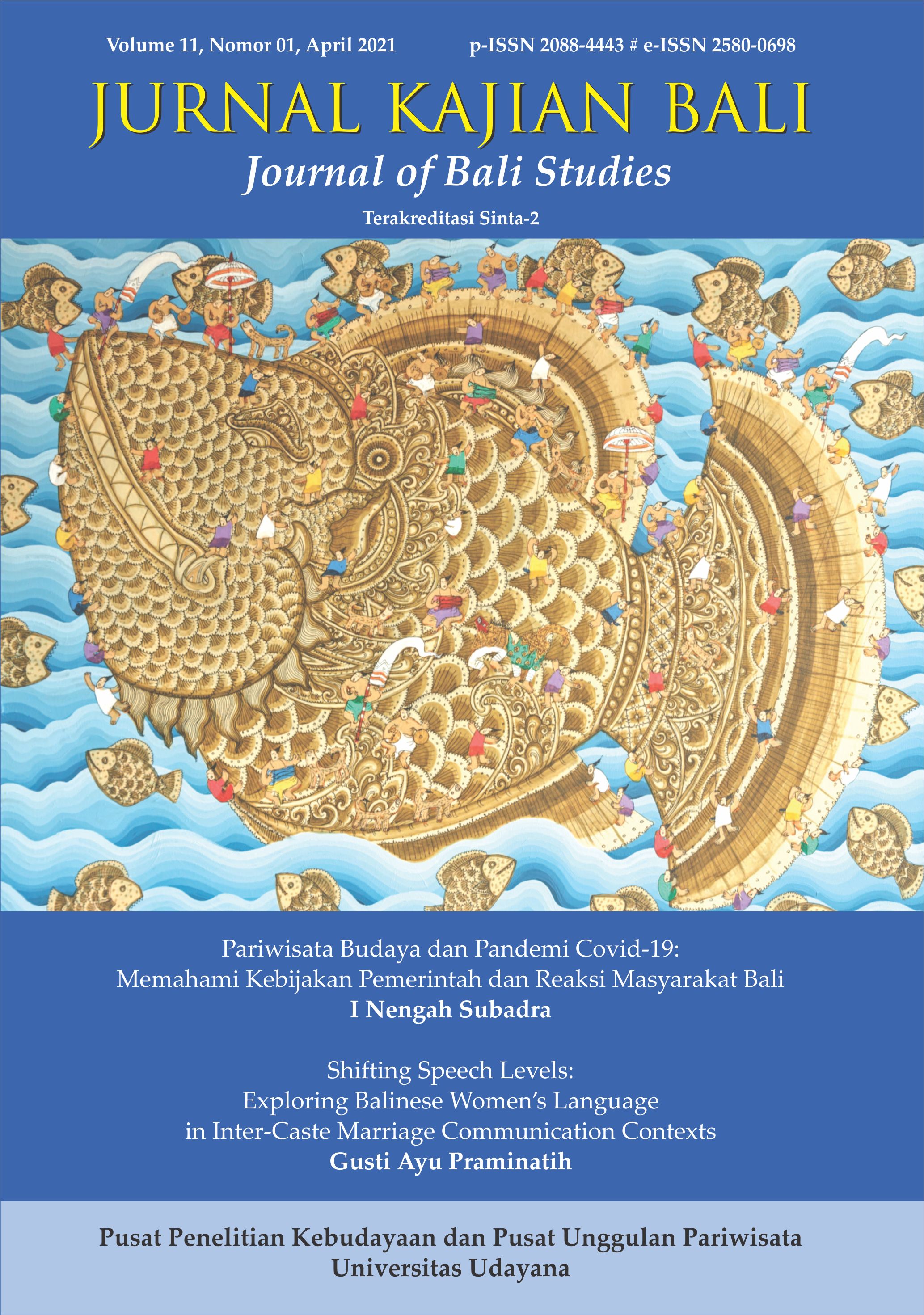Shifting Speech Levels: Exploring Balinese Women’s Language in Inter-Caste Marriage Communication Contexts
Abstrak
This article aim is to engage with and make sense of Balinese women’s language based on a case study that drew on the narratives of two Balinese women with different social class backgrounds. Inter-caste communication requires different speech levels between interlocutors; thus, this article has two main objectives. Firstly, to explore how life events occurred during inter-caste marriages and how they affected these two women set their speech levels. Secondly, to examine the identity constructed through their speech levels. To do so, this author employed ethnographic research, narrative analysis, and sociolinguistics theory. The researcher obtained meaningful stories narrated by the two women through in-depth interviews. The results revealed that these Balinese women constantly shifted their speech levels in inter-caste marriage communication contexts. This shifting of speech levels was also related to the presenting or negotiating identity construction for these Balinese women.
##plugins.generic.usageStats.downloads##
Referensi
Apte, M. L. (2001). “Language in Society: Overview.” In Concise Encyclopedia of Sociolinguistics, edited by Rajend Mesthrie, 36–48. Oxford: Elsevier.
Bucholtz, Mary. (2011). White Kids: Language, Race and Styles of Youth Identity. Cambridge: Cambridge University Press.
Coupland, Nikolas. (2001). “Introduction: Sociolinguistic Theory and Social Theory.” In Sociolinguistics and Social Theory, edited by Nikolas Coupland, Skrikant Sarangi, and Christoper N. Candlin, 1–26. Essex: Pearson Education Limited.
Eckert, Penelope, and Sally McConnell-Ginet. (2003). Language and Gender. Cambridge: Cambridge University Press.
Fought, Carmen. (2006). Language and Ethnicity: Key Topics in Sociolinguistics. Cambridge: Cambridge University Press.
Gelgel, Ni Made Ras Amanda. (2016). “Perempuan Gianyar dan Belenggu Ranah Publik Dan Privat.” Jurnal Kajian Bali 6 (1): 173–210.
Georgakopoulou, Alexandra. (2006). “The Other Side of the Story: Towards a Narrative Analysis of Narratives-in-Interaction.” Discourse Studies 8 (2): 235–57.
Hollway, Wendy, and Tony Jefferson. (2000). Doing Qualitative Research Differently: Free Association, Narrative and the Interview Method. London: Sage Publications Ltd. https://doi.org/10.1007/s10038-006-0368-7.
Holmes, Janet. (2004). “Power, Lady, and Linguistic Politeness in Language and Women’s Place.” In Language and Women’s Place: Text and Commentaries, edited by Mary Bucholtz, 77–102. Oxford: Oxford University Press.
Holmes, Janet. (2006). Gendered Talk at Work: Constructing Social Identity Through Workplace Interaction. Edited by Jennifer Coates, Jenny Cheshire, and Euan Reid. Oxford: Blackwell Publishing. https://doi.org/10.1002/9780470754863.
Labov, William. (1990). “The Intersection of Sex and Social Class in the Course of Linguistic Change.” Language Variation and Change 2 (2): 205–54. https://doi.org/10.1017/S0954394500000338.
Lakoff, Robin. (1973). “Language and Woman’s Place.” Language in Society 2 (1): 45–80. https://doi.org/10.2307/4166a707.
Mahboob, Ahmar, Dwi Noverini Djenar, and Ken Cruickshank. (2015). “Identity and Mode as a Frame for Understanding Social Meanings.” In Language and Identity across Modes of Communication, edited by Richard J. Watts and David Britain, 20–41. Berlin: De Gruyter Mourton.
Omoniyi, Tope. (2006). “Hierarchy of Identities.” In Sociolinguistics of Identity, edited by Tope Omoniyi and Goodith White, 11–33. London: Continuum.
Otsuji, Emi. (2010). “‘Where Am I From’: Performative and ‘Metro’ Perspectives of Origin.” In Language and Culture: Reflective Narratives and the Emergence of Identity, edited by David Nunan and Julie Choi, 186–93. New York: Routledge. https://doi.org/10.1016/j.langcom.2003.11.001.
Ottino, Arlette. (2006). “Revisiting Kinship in Bali: Core-Lines and the Emergence of Elites in Commoner Groups.” The Asia Pacific Journal of Anthropology 4 (1–2): 25–53.
Putra, I Nyoman Darma. (2011). A Literary Mirror: Balinese Reflections on Modernity and Identity in the Twentieth Century. Leiden: KITLV Press. https://doi.org/10.1177/0040571X3903822812.
Putra, I Nyoman Darma, and Helen Creese. (2016). “Negotiating Cultural Constraints : Strategic Decision-Making by Widows and Divorcees (Janda) in Contemporary Bali.” Indonesia and the Malay World 44 (128): 104–22. https://doi.org/10.1080/13639811.2015.1100869.
Raka, Anak Agung Gede, Novi Anoegrajekti Yasa, and Putu Ngurah Suyatna. (2020). “Dampak Psikologis Kekerasan Dalam Rumah Tangga Terhadap Perempuan Pada Budaya Patriarki Di Bali.” Jurnal Kajian Bali 10 (1): 283–304.
Sartini, Ni Wayan. (2020). “Ekspresi Verbal Masyarakat Bali Terhadap Kelahiran Bayi: Kajian Linguistik Kebudayaan.” Jurnal Kajian Bali 10 (2): 395–416.
Saussure, Ferdinand de. (2011). Course in General Linguistics. New York: Columbia University Press.
Spender, D. (1998). Man Made Language. Second Ed. London: Pandora Press.
Tannen, Deborah. (1991). You Just Don’t Understand. Public Relations Review. New York: Ballantine Books. https://doi.org/10.1016/0363-8111(91)90045-m.
Trudgill, Peter. (2000). Sociolinguistics: An Introduction to Language and Society. Edited by David Crystal. Fourth Ed. London: Penguin Books. https://doi.org/10.2307/326846.
Wardhaugh, Ronald. (2006). An Introduction to Sociolinguistics. Fifth Ed. Oxford: Blackwell Publishing. https://doi.org/10.1353/lan.2003.0268.
Wertz, Frederick J., Kathy Charmaz, Linda M. McMullen, Ruthellen Josselson, Rosemarie Anderson, and Emalinda McSpadden. (2011). Five Ways of Doing Qualitative Analysis: Phenomenological Psychology, Grounded Theory, Discourse Analysis, Narrative Research, and Intuitive Inquiry. First Ed. New York: The Guilford Press.

This work is licensed under a Creative Commons Attribution 4.0 International License.



